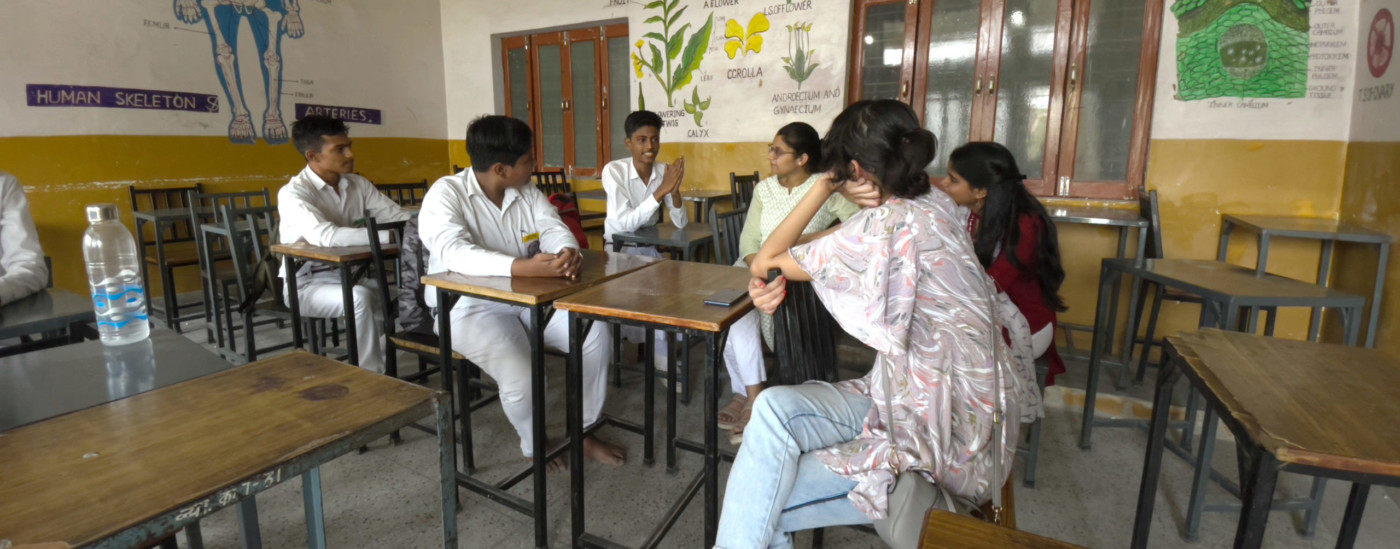
Notes on despair and hope
This story is a part of Field Notes, a series where Medha team members share their opinions and experiences from working on the field.
As a young professional, I am hopeful about making an impact after joining the social sector. But there are days when, as a remote worker, I sit at my desk amidst all the luxuries and comfort and gaze outside my window to think: Is this how I will leave the world better than I found it?
At times, I feel disconnected from the situation on-field, have my fair share of doubts about the impact being created and second-guess my contribution. So my recent visit to Kanpur and Jhansi, where I met the field team and interacted with students and other stakeholders, was a welcome opportunity. It was a chance for me to experience the situation on-ground and get practical exposure to our work.
The experience made me reflect on how it was one thing to read about youth unemployment stats in our strategy deck and entirely another thing to walk into colleges and schools, meet the stakeholders, interact with students, and listen to their stories in intrinsic detail.
It was one thing to read about youth unemployment stats in our strategy deck and entirely another to walk into colleges, interact with students, and listen to their stories in detail.
I realized how hard-hitting the reality of the problem we are trying to solve could be. “Students struggle to even introduce themselves during interviews; we know there is talent, but we feel we have not been able to help them explore their potential,” said a college coordinator. Another college principal shared how painful it was to see their final-year students struggle to write a letter.
When young girls were asked about their dreams and aspirations, there was silence in the school classroom which was hard to fathom. There were discussions around corruption, lack of motivation among teachers, pressure on young girls to get married, and lack of support from parents to pursue a career of choice.

When you’re working in the social impact space, the list of challenges doesn’t indicate that “everything is wrong” – it’s just something you accept and work towards solving in the best way possible. But even then, sometimes you can’t help but slide into a feeling of despair and hopelessness. There were many such moments during the visit when I felt hopeless.
Then there were also many heart-warming interactions with young students that gave me a different perspective and helped me look for the silver lining.
Students’ eyes brimmed with happiness as they talked about a change in self-confidence and public speaking skills. They discussed their improved ability to make decisions and get an internship in their field of interest post completing a Medha course. “I wouldn’t have even been able to make eye contact and interact with you to share my story had I not been a part of Medha,” said one female alumnus.
Some students reflected that their focus was only on a particular career option. Still, interactions with the Medha team made them aware of other possible options. “There was an online industry talk by a sugarcane farmer; it was beneficial for me,” shared an aspiring businesswoman, her eyes shining with hope for the future. “One of my relatives says, ‘Shinu (name changed), tumhe history banani hai!’ I used to doubt if that is possible, but my Medha mentor helped me believe that I can”, recalled a young woman.
Some faculty members were hopeful that such programs would help students develop much-needed skills beyond the course curriculum, tackle interviews, explore different careers, and achieve their dreams.

In the social sector, irrespective of your role, I think the reality of challenges is bound to make you hopeless on some days. It might even make you want to cry and leave it all behind, especially in the early years of your journey.
A non-profit’s interventions, no matter how well-laid, cannot solve or change everything for the better. Social issues are subject to too many variables, and our non-profit lens will only permit us to see so far.
A non-profit’s interventions, no matter how well-laid, cannot solve or change everything for the better. Social issues are subject to too many variables, and our non-profit lens will only permit us to see so far.
But when our team members see students come to them at the end of an exhausting day with a distinct glint in their eyes and a hope to work towards the future they want, maybe it all makes sense to them.
And as a remote worker, trying to indirectly support these initiatives on-field, eventually leading to better outcomes for our students, does take away some of my doubts and questions. The field experience makes me want to exchange the feelings of despair for a welcoming ray of hope.
So, yes. I am still gazing out of my window. But now I am trying to ignore the voice of doubt and recall the smiling faces of our students.